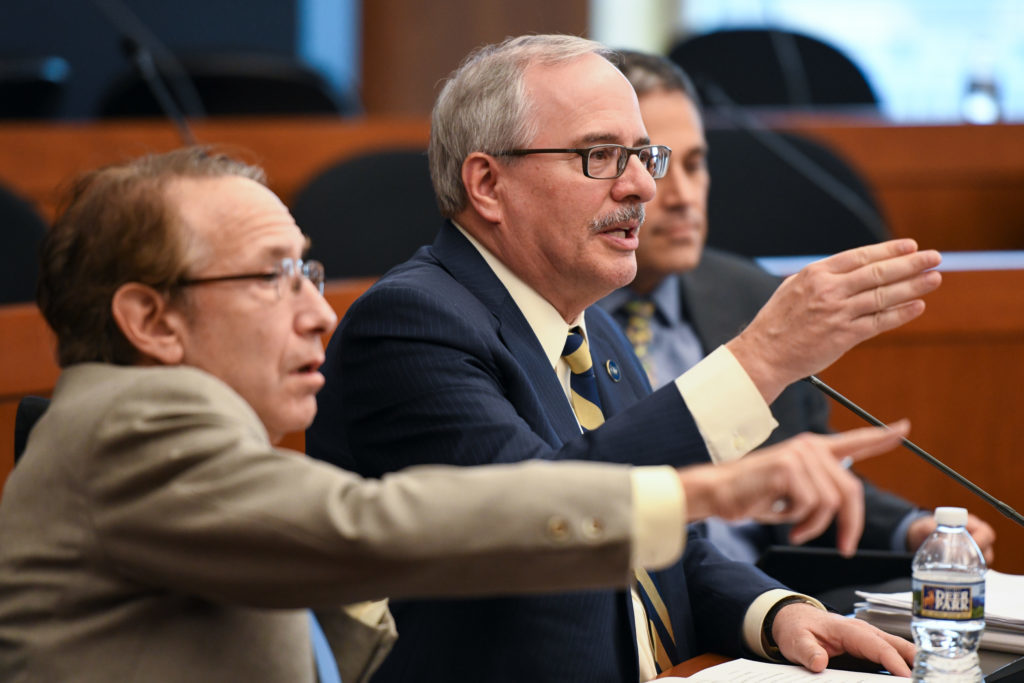GW’s top official is moving forward with plans to change the University’s bureaucratic culture for staff.
University President Thomas LeBlanc said he has started taking steps to improve employee morale and create a more service-oriented staff culture at GW – and plans to implement longer-term measures in the coming months. Experts said it’s unusual for a university president to focus on staff, and while significant change will be difficult to achieve, it could improve student and faculty satisfaction within the University.
LeBlanc announced at the Board of Trustees meeting earlier this month that employees will have the full week off between Christmas and New Years Day, a move he said was the most well-received measure he’s taken as University President.
“I’ve gotten more thanks for that than anything else I’ve done since I got here,” he said.
LeBlanc also clarified that staff have to work a full day on a Friday before a three-day weekend, prohibiting employees from leaving early – a change he called an important step in creating a “service-oriented” culture. He said the two moves combined will serve faculty and students who need services before the holidays and still give staff more time with their families.
“That’s an immediate impact that I think will send a message about serving our students and faculty, but also sending the message that we really do care about our staff,” he said at the Board meeting.
In the long-term, LeBlanc said officials plan to distribute a survey by the end of the academic year to identify issues in GW’s employee culture. He said the survey will be used as a “baseline” for future improvements to institutional culture, something he said GW has historically had no means to track.
“The problem with institutional culture is that it can be very amorphous,” he said in an interview. “When I talk about it everybody shakes their head and they go ‘yeah’ and kind of agree. But it’s all anecdotal.”
LeBlanc has also worked with Human Resources to develop a new staff orientation program for new employees. The program, which launched in January, is designed to introduce staff to the University’s overall vision rather than just run through a list of policies and emergency procedures, he said.
Sam Larson, assistant dean of operations and finance at Michigan State University, said it’s unusual for a university president to be so interested in staff concerns because their focus is traditionally on students and faculty. But she said staff help guide students through their college experiences.
“Often times I think staff are the first line of conversation for many students,” she said. “They get to know departmental staff, they get comfortable talking to them.”
Giving staff time off during winter break makes sense because it’s not a particularly productive time of year and staff can start the year off with more energy, Larson added.
LeBlanc has been focusing on the student experience in the opening months on campus – an effort officials say is also designed to improve the transactional nature of the University. Students and faculty have frequently complained about frustrating interactions with staff employees.
Faculty also depend on support staff for areas like research and technological help.
Faculty in the Columbian College of Arts and Sciences were affected when turnover from Human Resources slowed the hiring of support staff. The University is still without a permanent Human Resources director after Sabrina Ellis left the University in 2016.
Cynthia Herrera, the chief executive at the recruitment and retention consulting firm HR Guru, said a survey is one approach to keep the University’s “finger on the pulse” of institutional culture, but the survey could only be effective if LeBlanc has a clear goal and specific questions in mind.
Herrera said all corporations and nonprofits need to have a strong internal culture if they are going to effectively carry out their mission to the outside world.
“I do believe that he is thinking outside of the box,” Herrera said, referring to LeBlanc. “Trying to change institutional culture is like trying to change a ship that’s on the ocean, you can’t just make a quick left turn and you’re good. It’s a long lengthy process with a lot of work.”





